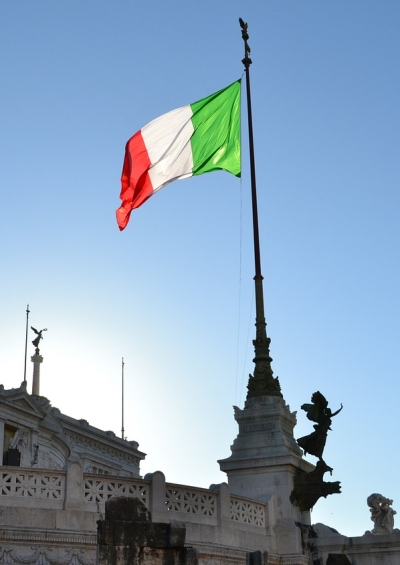Italy: Libya’s Former Colonial Master
Did years of painful colonial rule by the Italians shape Libya’s relationship with the West today?
March 22, 2020

Editor’s note: This article was originally published on March 8, 2004.
Italy was one of the last European powers to engage in imperial expansion. The Italian city-states were not unified until the second half of the 19th century.
Consequently, the Italian government was unable to exploit effectively the early colonial opportunities that Africa offered neighboring European states.
At the end of the 19th century, Libya was one of the last African territories not occupied by Europeans — and its proximity to Italy made it a primary objective of Italian colonial polity.
The Italian government saw itself carrying on the traditions of the Roman Empire even though Italian unification had occurred only few decades earlier — and Italy was not a leading power at the time.
Yearning for long-lost greatness
On the other hand, European contemporaries expressed surprise, given the depressed economic state of southern Italy, Sardinia and Sicily.
They wondered how Italy could "be so indignant at the neglected state of Tripolitania and Cyrenaica or wish to undertake their development before it has undertaken that of the two great Italian islands which might employ all her surplus population — and the development of which is even a peremptory national necessity."
Colonization as remedy for internal problems
Visionaries in Rome hoped to return Italy to its former greatness by creating a modern empire. In this regard, many Italians believed it was their historic right and obligation to apply Italian sovereignty to those regions in Africa once ruled by the Roman Empire.
Italy began to penetrate Ethiopia in 1879. But its expansion there suffered a severe blow with the defeat of Italian forces at Adowa in 1896, even though Eritrea was retained and a protectorate established over much of Somaliland.
In part in search of revenge for its humiliating defeat, Italy next turned its attention to Lybia. In December 1902, France and Italy created spheres of interest in North Africa, when they concluded a treaty that recognized the 'special interests' of France in Morocco and Italy in Libya.
In addition to issues of historical right and national pride, many Italians viewed overseas expansion as the best solution to a number of vexing internal problems. At the dawn of the 20th century, a newly unified Italy still suffered from mutual suspicion
and internal conflict.
The emigration problem
Italian leaders saw a foreign war as a means to divert attention from internal divisions, to unify the population — and to increase pride in the homeland. Moreover, overseas expansion offered a means to test the skills and weapons of the highly-rated ltalian armed forces.
Many Italians also believed that the colonization of Lybia offered an ideal settlement region for countrymen wishing to emigrate. Italian emigration to the United States exceeded 650.000 people in 1910, while emigration to other areas — like Argentina — was becoming more difficult because of the distance and expense involved.
A wishful plan for economic expansion
In contrast, Libya was situated close to Italy, enjoyed a pleasant climate with favorable coastal terrain and was only sparsely populated.
Many Italians viewed overseas expansion as the best solution to a number of vexing internal problems.
Remote myths regarding the fertility of certain areas of Libya only added to the enchantment of what came to be called the terra promessa — or promised land — for emigrants.
Finally, Italy was in need of cheap raw materials and markets for the development of its own economy. Based on limited information, many Italians believed the colonization of Libya would improve this situation. Little did they know that Libya's agricultural potential was poor, its industry limited — and much of its territory empty.
Formally in charge, unofficially powerless
In the words of a contemporary student of modern Italian history, "it was ironic to see railroads being built in Africa, when some Italian districts had been awaiting them for 50 years." Trade figures by no means justified these colonies — they remained a liability.
The Italian position in Libya at the end of World War I was not a brilliant one. "Actually, the possession was Italian in little more than name, for effective control by Italian arms and administration was confined to a narrow strip of the coastal region, and not even the whole stretch of coast."
A vicious crackdown
From 1917 to 1923, known as the period of accords, the Italian government negotiated with a variety of Libyan factions in an effort to consolidate peacefully its occupation of the country.
After the Fascist takeover in October 1922, the Italian government of Benito Mussolini implemented a much more rigid colonial policy. In early 1923, the Italian armed forces embarked on a brutal reconquest of Libya.
Enjoying an overwhelming superiority in men and equipment, the Italian army had some 20,000 men in the field — while
Libyan guerrilla forces seldom numbered more than l,000.
Widespread devastation
The Libyan population by the mid-1930s had been cut in half due to emigration, famine and war casualties. The loss of much of the educated elite and middle class — in the face of a severe disruption of coastal agriculture and domestic trade — was especially significant.
When assessing the full impact of Italian colonial practices, it is telling to note that the Libyan population, approximately 1.5 million in 1911, was at the same level in 1950.
Briefly in firm hands
On January 9, 1939, the colony of Libya was incorporated into metropolitan Italy and thereafter considered an integral part of the Italian state — until the North African campaigns of World War II left Libya in British and French hands.
Takeaways
Italy was one of the last European powers to engage in imperial expansion. Consequently, it was unable to exploit Africa’s early colonial opportunities.
Visionaries in Rome hoped to return Italy to its former greatness by creating a modern empire – by applying Italian sovereignty to regions once ruled by the Roman Empire.
Italian leaders saw a foreign war as a means to divert attention from internal divisions, to unify the population — and to increase pride in the homeland.
